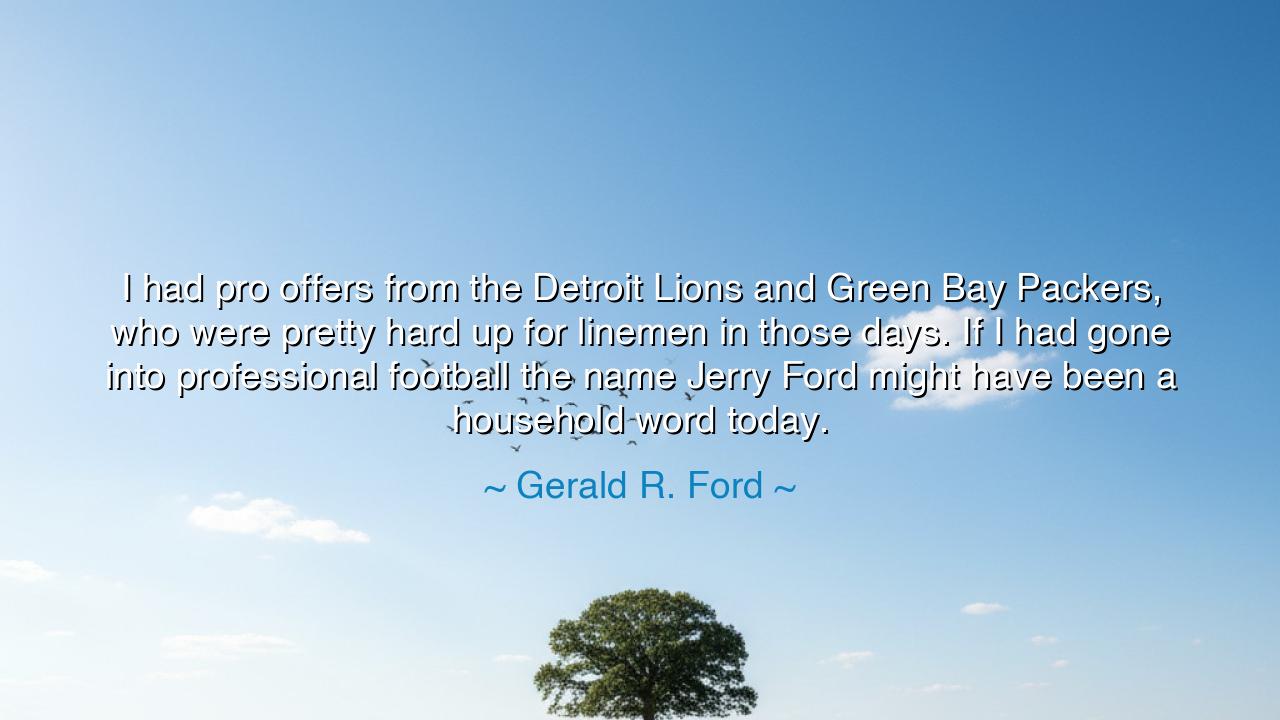
I had pro offers from the Detroit Lions and Green Bay Packers
I had pro offers from the Detroit Lions and Green Bay Packers, who were pretty hard up for linemen in those days. If I had gone into professional football the name Jerry Ford might have been a household word today.






When Gerald R. Ford, the thirty-eighth President of the United States, reflected, “I had pro offers from the Detroit Lions and Green Bay Packers, who were pretty hard up for linemen in those days. If I had gone into professional football the name Jerry Ford might have been a household word today,” he spoke with humility, humor, and profound awareness of life’s crossroads. In this quote, he reveals how fate presents us with diverging paths, each carrying its own promise of renown, but also its own cost. Ford’s life was not merely the story of an athlete, nor merely of a politician—it was the story of a man who chose service over glory, duty over fame.
The origin of this statement lies in Ford’s youth. At the University of Michigan, he was a stalwart of the gridiron, a strong and disciplined lineman who helped lead his team to national championships. His prowess drew the attention of the great professional teams—the Detroit Lions and the Green Bay Packers—and in another life, he might have stood beneath stadium lights, cheered by thousands, remembered as a titan of sport. But Ford turned away from that path. He chose instead to pursue law, public service, and eventually, the heavy mantle of political leadership. His words, then, are not regret, but a meditation on destiny: how a man’s name becomes known, and for what reasons.
The ancients knew this truth well. A warrior could win honor with the spear or with the lyre; a statesman could win renown in council or in battle. But the path chosen defined not only the man’s fame, but his legacy. Ford might have become a household name on the field, but it was his leadership during one of America’s darkest hours—the aftermath of Watergate—that secured his place in history. His quote is tinged with wry humor, yet beneath it lies the recognition that fame is fleeting, but service endures.
Consider the story of another athlete turned statesman: Dwight D. Eisenhower. In his youth, Eisenhower loved football at West Point, but an injury ended his athletic career. That closed door redirected him toward a military path that would one day lead to the liberation of Europe and the presidency of the United States. Had Eisenhower remained only an athlete, he might have known applause, but the world would have been poorer for it. So too with Ford: he sacrificed the glory of sport for the quiet, grinding labor of governance. When the nation needed stability, it was his steady hand that guided the ship of state.
The lesson is clear: life presents each of us with choices between the path of immediate recognition and the path of deeper responsibility. The first may bring applause and fleeting renown; the second often brings hardship, patience, and sacrifice—but also the chance to leave behind a legacy that endures beyond the cheering crowd. Ford’s words remind us that true greatness is not always visible in the stadium’s roar, but in the silent strength of those who lead through storms.
What then should we do? First, recognize that your gifts may open many doors, but not every door should be walked through. Choose the path that aligns with service, purpose, and the greater good, not only the path that flatters your vanity. Second, cultivate humility. Ford joked about being a household name, but his true fame came from steady leadership, not from glory-seeking. Third, embrace the unseen victories: the times you sacrifice comfort, applause, or recognition for the sake of others. These are the choices that build legacies.
Thus, Ford’s words live not as idle reflection, but as timeless guidance: “If I had gone into professional football the name Jerry Ford might have been a household word today.” In truth, his name became a household word not for touchdowns or championships, but for calm amidst chaos, for integrity in the wake of scandal, for the quiet strength of a man who chose duty over glory. May we too learn from his example, seeking not merely the fame of the moment, but the honor of a life well served.






AAdministratorAdministrator
Welcome, honored guests. Please leave a comment, we will respond soon